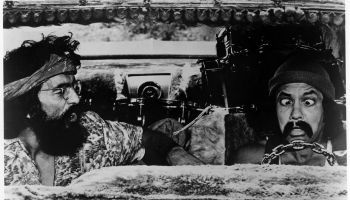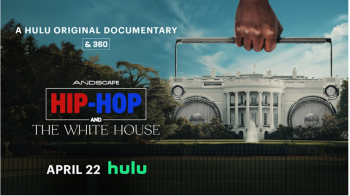If you had asked me a few months ago what I thought about the war in Afghanistan, I would have had a lot to say. I’m never shy about voicing my opinions. But I probably wouldn’t have mentioned money. Now that I’ve been over there courtesy of the USO, I see money – and big business taking precedence over life – as a recurring theme of the war.
I accepted the USO’s invitation to visit our troops in April, but didn’t want this to be some poseur mission, shaking hands and taking pictures while never really getting to connect with the troops and expressing my earnest appreciation. As a former Marine, I was happy to know that Wipeout host Jill Wagner – daughter of a Marine – would be accompanying me.
As my departure date neared, I feared the trip could be a big mistake. I’m very vocal on Twitter and Facebook about my diminishing faith in the US Government amidst the corporate takeover. I wondered how many gung-ho soldiers, airmen, devil-dogs, etc. had taken offense at my rants, but it was too late to turn back.
Before entering Afghanistan we had to be checked into the Manas Airbase Transit Center in Bishkek, Kyrgyzstan. The base was like a city built within a city: equipped with its own hospital, barber shop, massage parlor, Burger King, commissary, recreation center and night club called Pete’s Place (named after NY Fire Department Chief Peter Canci who died on 9/11). Every penny spent on the Manas Airbase (from food and beverage to construction) had to be accounted for. The entire operation was ripe with independent contractors from across the globe. The Kyrgyzstan government charges $60 million a year to share their Bishkek airport
with our military! That agreement also requires US Military to hire a percentage of local civilians. It was business as usual.
Once we were briefed on our mission, we flew into Bagram Airfield in Northern Afghanistan. As we touched down, I couldn’t help but notice more independent contractors, more construction and this base had its own post office bigger than any post office I’d ever seen. Were we also paying the Afghan government to be here?
According to the Afghan calendar, the year is now 1392 and much of the country looked and felt that way. While Kabul has developed into a fully westernized city, the majority of Afghanis live in mud huts, with no running water, no irrigation, no electricity or underground sewage.
Surprisingly our troops in the field were living under quite similar conditions. Some bases were small — housing 200 people max while other bases housed 700. Bases in the field felt like third world villages with windowless wooden huts, covered in sandbags to absorb shrapnel from constant bombings. There was an overwhelming stench from the outdoor bathrooms and temperatures were known to reach 130 degrees.
The troops were so polite and disciplined. They’d form lines waiting patiently to take pictures and shake hands. Jill and I despised the formality. We felt awkward having the very people who defend our lives wait in line to say hello. We insisted on breaking up the lines and visiting the troops on their posts: If you were a team of mechanics we’d meet you in the garage. If you were a cook we’d come hang out in the chow hall and shoot the shit like regular damn people. This allowed us to lift the veil and get a much more personal look into the lives of the troops.
Many spoke of the toll being away from home for nine months takes on their marriage, while women elaborated on the difficulties of having to be away at war while their husbands were left home to look after the kids. Others expressed their disappointment at how little support they’d gotten from civilians back home. They felt as if they’d been left for dead or forgotten. They explained that after the Soviet-Afghanistan war the Russians haphazardly dumped their explosives all across Afghanistan as they exited in defeat. Now, troops not only had to be mindful of IEDs planted by insurgents but also had to be aware of Russian landmines scattered randomly throughout the landscape. Young Afghan children often were victims of landmines. We saw a soldier with a reversible knee. Yes, his knee bent in both directions after being hit with shrapnel from an IED. One soldier rejoiced in being able to take a shower that week. A young airman went on and on about how crazy Jill and I were for coming to Afghanistan during fighting season. We learned of a young soldier who’d joined a few Afghani kids in a friendly game of soccer when a teenaged Afghan boy approached and stabbed him to death just days before our arrival.
What really stood out to me was that every single Soldier, Airman, Coast Guard and Marine I met had a firm handshake, solid eye contact and a strong sense of purpose. Their gratitude and the way they engaged us emphasized just how precious life really is and how a sense of purpose keeps us going.
As I toured the military bases I was allowed to toggle missile launchers, climb aboard fighter jets and MWRAPs -which prompted so many questions. What kind of human being would invest up to $40,000 to build one missile? Who could take pride in constructing such killing machines? Why would anyone scatter bombs across a beautiful landscape knowing someday a child would want to play there? How could anyone be so methodical and insensitive at the same time? How does a civilization so invested in God suffer such a fate? Countless toddlers had lost their limbs in a war they were too young to understand. There were so many angry teenagers with not one blood relative to turn to and thousands of Afghan civilians who’d lost entire families to miscalculated bombings. Did I mention 46 US casualties in the last month?
I thought of Darfur, Syria, Pakistan, Panama, Grenada, Nicaragua, Vietnam and a list of others. But this time I wasn’t reading about it or watching a documentary; I was in Afghanistan staring evil in the face. I could smell the gunpowder, I could sense the acute awareness amongst US troops and I felt life’s uncertainty. Where the hell was God? Who gives who the right to put a price tag on a man’s life? What EXACTLY is the greater good in this scenario? What don’t I understand? The troops expressed similar concerns. But the only way to maintain sanity under such circumstances is to immerse oneself in the mission and ask questions later.
I found it so hard to say goodbye to our troops stationed on these remote bases for nine months at a time. It didn’t seem fair that they’d have to live in harm’s way with so much life and potential ahead of them.
With this on my mind we returned to the Bagram Airbase where I insisted I sleep in the same plywood huts that the soldiers slept in. That very night we were bombed. I had only been there a week and I was already so desensitized to the danger that I woke up, put on my helmet and body armor, and went right back to sleep. When the civilian volunteers came to check on me they got a good laugh at me sleeping in my body armor.
And that was the lesson I would take home with me. How is it here at home people avoid eye contact, offer flimsy handshakes and end up mired down in student loan debt with no sense of purpose whatsoever? How are we able to point our camera phones into life threatening scenarios before thinking to offer assistance? Even here in the US we merely put on our individual body armor and go back to sleep.
Martin Luther King once submitted “A man who hasn’t found something he is willing to die for is not fit to live.” Today, I am grateful for every moment of existence, for my limbs, for my family and for love. But I am also aware that justice and life are not guarantees –only death is. I am now believe that the privilege of dying a meritable death requires committing to a life of purpose. For without purpose we die in vain.
Actor Romany Malco has appeared in such films as The 40 Year Old Virgin, Baby Mama, Blades of Glory and Think Like a Man as well as starring in the hit TV show Weeds. He is a former Marine from Brooklyn.















